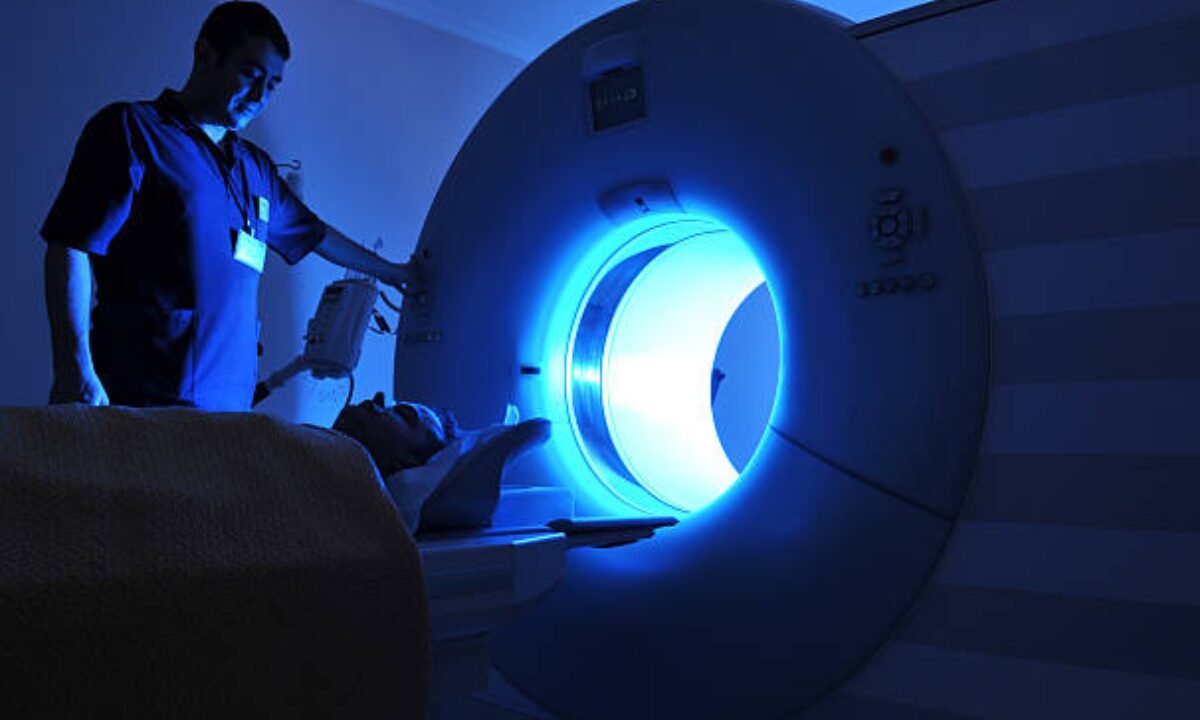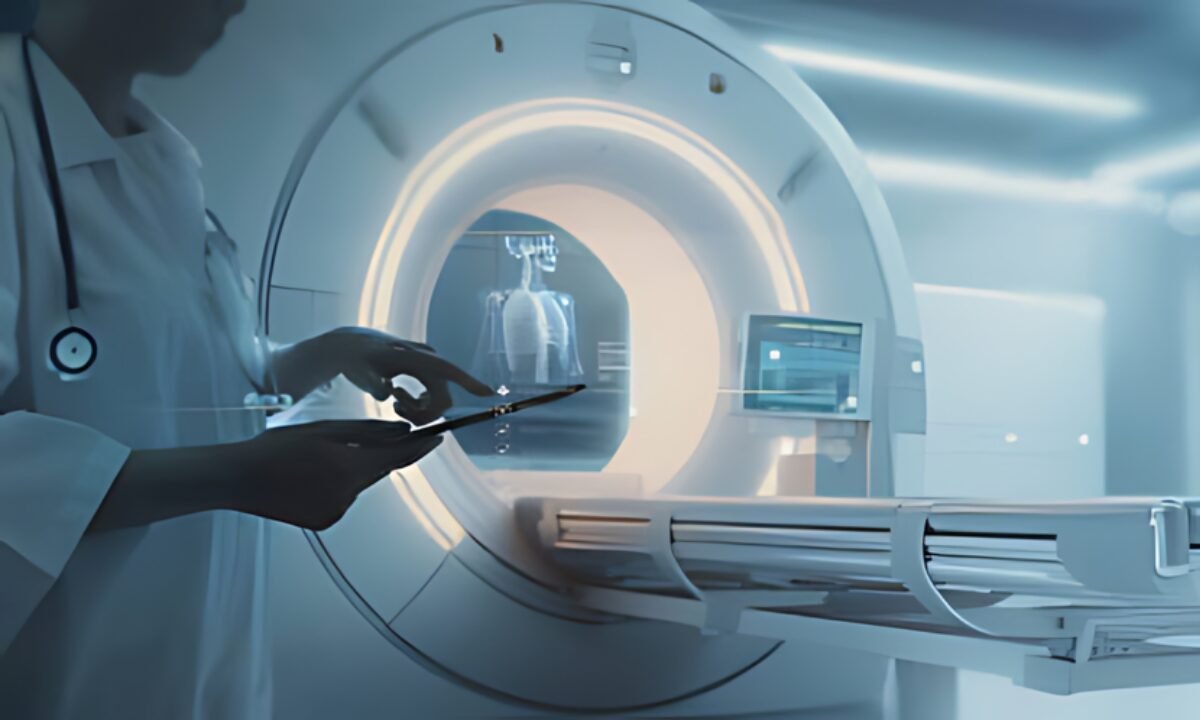MRI Scan or Magnetic Resonance Imaging Scan is a medical technology in the assessment of organs, tissues, bones, and other body structures in different hospitals and clinics. An MRI essentially is an imaging technique that entails employing strong magnetic fields as well as radio waves to produce imagery of the interior of the human body. In this ultimate guide, we will discuss what an MRI scan means, its advantages, and some things you should know about this frequent type of examination.
What is an MRI Scan?

MRI stands for magnetic resonance imaging and it is a painless test used by medical practitioners to help in analyzing the results of various illnesses. In an MRI, you recline on a flattish platform that then moves into the huge circular scanner that does not use X-rays in taking pictures of your body but instead uses magnets and computers.
The MRI scanner which is also known as magnetic resonance imaging utilizes magnetic fields and radiofrequency pulses to align hydrogen atoms in your body. This in turn makes the atoms emit radio signals which are read by the computer used in the method. This way, the computer is capable of producing cross-sectional pictures or sections, also referred to as slices of the part of the body under scan.
What does an MRI Procedure Entail?
When you come for an MRI scan you have to dress according to the scan type selected and remove all metals such as; jewellery, glasses, and hair clips among others as they may hamper the strong magnetic force used. You may be asked to change into a hospital gown if you are going to be staying at the hospital for a long time. The technician will assist you arrange yourself on the table that moves into the MR machine.
You will be completely on your own with nothing but the scanner surrounding you, however, the technician will be able to see, hear you, and communicate with you at the same time. The scanner is also bound to produce rather loud banging and humming noises during the scan. You must remain very still as movement can cause blurred images. The actual scan takes 15-90 minutes depending on the body area imaged.
Preparation Steps for an MRI
Before getting your MRI scan, there are some matters of importance you have to first accomplish. The technician or the doctor wants to know if the patient has any medical implant or metal on him/her. You may require an indication if you have a cardiac pacemaker or some other implants. Eat and drink normally unless asked to avoid foods containing dyes or iron which may blur the images.
For safety, do not wear any metal including jewellery and other metallic items. Some places may require you to put on a hospital gown if one is to be provided. When you are making the booking let them know if you are claustrophobic or if you have any other condition that may make it difficult to be enclosed.
Benefits of MRI over Other Scans
Compared to X-rays, CT scans, or ultrasound, MRI has some unique advantages:
- MRI uses strong magnetic fields rather than ionizing radiation making it safer. It does not use any damaging radiation.
- MRI is efficient in providing contrast between tissues and muscles, ligaments tendons, etc.
- MRI makes it possible to get multi-planar or cross-sectional images in any plane and therefore the body structures can be viewed in different planes.
- It has high resolution and clarity allowing the detection of even small abnormalities, lesions, or tumors.
- MRI is very good for imaging internal organs, the brain, spinal cord, and joints where other tests may have limitations.
- Some scans like MRI angiography can study blood vessel structure and flow non-invasively.
- Contrast dyes, if used during MRI, provide even better visualization of targeted tissues and structures.
Important Things to Note
This is because other important information that the doctor needs to be aware of includes a history of allergy to contrast dyes if they intend to use one during an MRI.
- Avoid bringing along items containing metal such as jewellery, watches, hair clips, and credit cards among others when going for the MRI scan.
- You might be requested to wear a hospital gown to your operation dress depending on the regulatory measures on the wearing of metallic items such as clothes with fasteners or zippers near the MRI equipment.
- If a person has claustrophobia or fears small enclosed spaces, he/she should inform the technicians before the procedure or operation. Medications can be given to help relax.
- Expect to hold very still while images are being captured as movement causes blurring artifacts. You’ll be able to breathe normally though.
- The loud banging, thumping, and vibrations from the MRI scanner are normal. Earplugs or headphones with music are provided to some patients.
- Wait for the radiologist’s evaluation and diagnosis. Do not self-diagnose based on the pictures which are reviewed alongside your symptoms and medical history.
MRI Areas and Applications
Some common types of MRI scans and the body areas or conditions they are used to study include:
- MRI brain and spinal cord – Head injuries, intracranial space-occupying lesions, infections, demyelinating diseases, spine disorders, etc.
- Joint MRI – Injuries to ligaments, tendons, cartilage-like torn meniscus, tendinitis and arthritis.
- MRI of the abdomen and Pelvis – organs in the abdomen and pelvis, tumors, any disorders in the liver, kidney, ovary, and so on.
- Breast MRI – Diagnostic tool used in cases where breast cancer is suspected including on high-risk women and in cases where a mammogram is ambiguous.
- Conventional angiography MRI – Blood vessels and structure of the brain vessels, heart, kidney as well as the extremities.
- Cardiac MRI – Heart muscle, valves, and arteries assessing conditions like cardiomyopathy or blockages.
In Conclusion
MRI scan is a noninvasive technique of medical imaging that has found broad application in diagnosis and intervention in present-day practice. This guide entails details on what patients need to know in case they are scheduled for an MRI, why MRI is preferred over other scans, and places MRI can focus on. Proper preparation and communication of medical history ensures safe, quality images are obtained for accurate diagnosis. Contact your doctor from Koshikaa or a radiologist if you need any clarification on your scheduled MRI scan.

